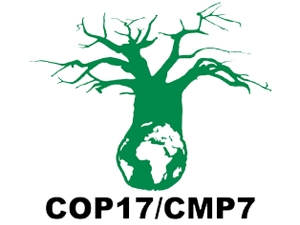
The United Nations Climate Change Conference in Durban, South Africa, begins today, 28 November, and will continue until 9 December 2011. The event includes the 17th Conference of the Parties (COP 17) to the UN Framework Convention on Climate Change (UNFCCC) and the 7th Conference of the Parties serving as the Meeting of Parties to the Kyoto Protocol (COP/MOP 7). The importance of the UN climate change summit, in my view, is undisputable, but is made even more relevant by a new assessment of global warming by the Berkeley Earth Surface Temperature project, which confirms that the Earth is indeed warming.
I am sure nobody will be surprised to read that the climate sceptics tried again to over-shadow the UN climate talks a few days before the conference was due to open. Again they hacked email correspondences from the University of East Anglia, UK, climate study group and claim that scientists there have manipulated data on climate change. The New York Times reported that climate scientists said that the release was likely to have been timed to "torpedo" any potential progress at the UN Climate Change Conference. Just to remind the readers, I would like to add that: following the 2009 incident, it was concluded that the emails did not indicate that scientists had manipulated data, but instead they were criticised for failing to share data or respond adequately to freedom of information requests.
One result which will most probably disappoint the climate sceptics is that reported in the latest issue of Nature Climate Change, confirming that the Earth is warming, based on a report from the Berkeley Earth Surface Temperature project released last month (October 2011). Nature Climate Change called the report “the most comprehensive review of the data yet released, funded in part by climate sceptics.”
The aim of the Berkeley project is to resolve current criticism of the former temperature analyses and to prepare an open record that will allow rapid response to further criticism or suggestions. Our results include not only our best estimate for the global temperature change, but estimates of the uncertainties in the record, says the project's director, physicist Richard Muller.
The choice of stations and the methods for correcting systematic errors are just two of the issues that have been criticized with regard to climatic studies. The Berkeley Earth Surface Temperature study set out to do a new analysis of the surface temperature records in a rigorous manner that addresses this criticism. The project is using over 39,000 unique stations, which is more than 5 times the 7280 stations used in the Global Historical Climatology Network Monthly data set (GHCN-M) that served as the basis for many climate studies.
According to the Berkeley project, by far the most important indicator of global warming has been the land and sea surface temperature record.
The latest UN climate negotiations aims to discuss mitigation and adaptation measures to curb global warming and avoid climate change, and the meetings in Durban are expected to result in decisions that would put in operation a technology mechanism to promote clean energy and adaptation-related technologies, an adaptation framework to support developing countries, and the Green Climate Fund. A second focus will be the question of how the international community will collaborate in tackling climate change in the future.
Discussions are expected to focus on a timeline for developing a future framework under the Convention and also on an upcoming review of the adequacy of, and progress towards, limiting average global temperature rise to 2°C. This review is scheduled to take place between 2013 and 2015. Although a major breakthrough is not expected in Durban, many view the meeting as an important opportunity to deliver both operational decisions and some longer-term signals on the future direction of the process.
A joint COP and COP/MOP high-level segment involving government ministers and other senior officials will also take place from 6-9 December.
Going back to the climate scepticism issue, interestingly, a recent University of Oxford – Reuters Institute for the Study of Journalism (RISJ) study of climate change coverage (Painter, 2011) suggests that newspapers in the UK and the US have given far more column space to the voices of climate sceptics than the press in Brazil, France, India and China. More than 80% of the times that sceptical voices were included, they were in pieces in the UK and US press, according to the research. Maybe this is because the press in Brazil, France, India and China trust scientific evidence more than scepticism, or maybe these countries or Brazil and India, at least, have been experiencing actual signs of climatic change, e.g an increase in extreme weather, such as floods.
My search of the CABI internet resource 'Environment Impact' (EI) gave over 40,000 records on 'climate change', including journal articles, ebooks, reports, reviews and news articles, which can be viewed by subscribers of the EI subset of the database.
References and Further Reading
Purvis, N.; Stevenson, A. (2011) Climate negotiations and international finance. Resources for the Future, Washington, USA, Resources (Washington), 2011, 177, pp 16-18.
Painter, J. (2011) Poles Apart: the international reporting of climate scepticism. University of Oxford, Reuters Institute for the Study of Journalism.
Cattiaux, J.; Vautard, R.; Cassou, C.; Yiou, P.; Masson-Delmotte, V.; Codron, F. (2010) Winter 2010 in Europe: a cold extreme in a warming climate. American Geophysical Union, Washington, USA, Geophysical Research Letters, 2010, 37, 20, pp L20704.
Nerlich, B. (2010) 'Climategate': paradoxical metaphors and political paralysis. White Horse Press, Isle of Harris, UK, Environmental Values, 2010, 19, 4, pp 419-442, many ref.
Link to Berkeley study paper.
Link to COP17 page.
